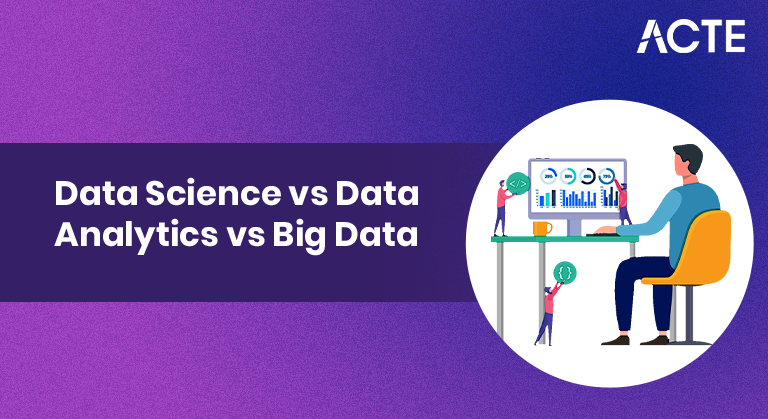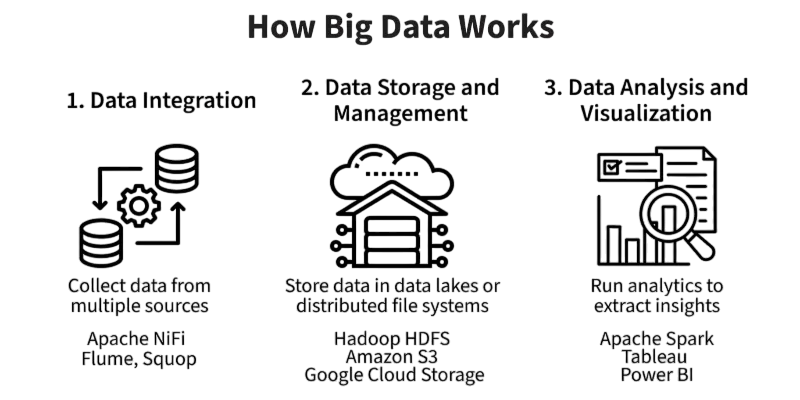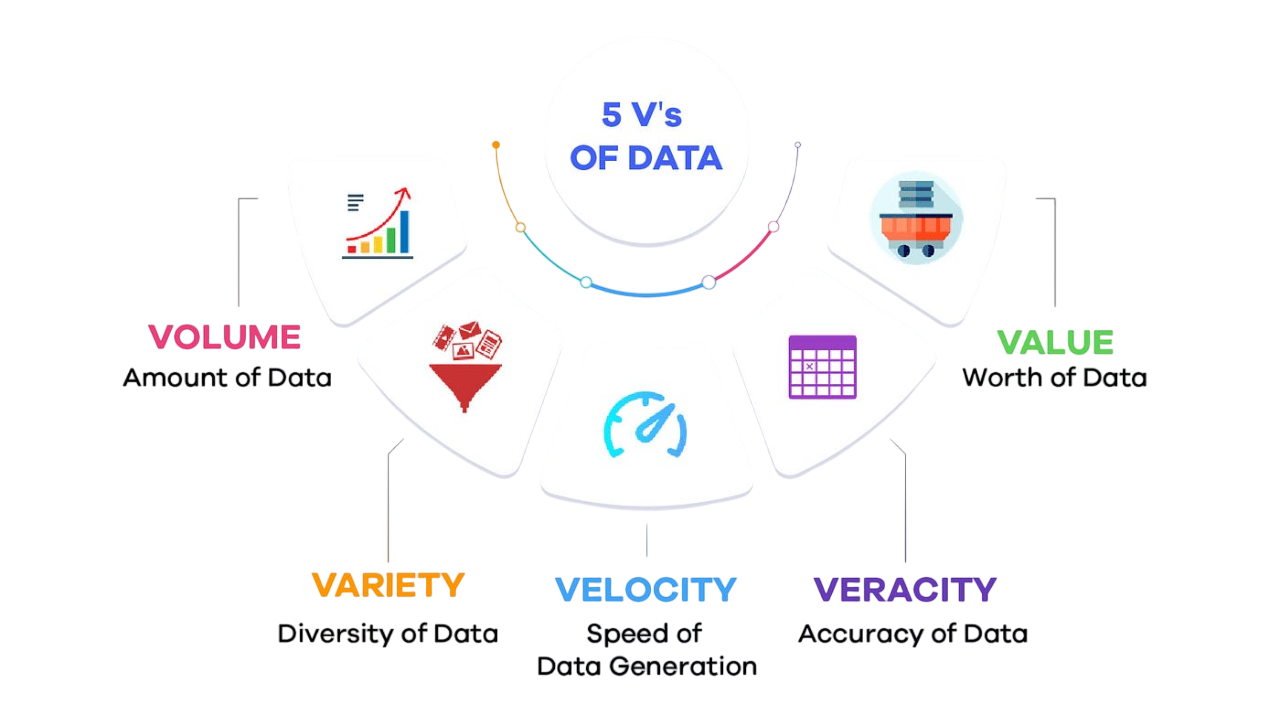
- The Confusion Around Buzzwords
- What is Data Science?
- What is Data Analytics?
- What is Big Data?
- Comparative Overview: Scope, Tools, and Techniques
- Key Skills Required for Each Field
- Industry Use Cases: Real-World Applications
- Career Path Comparison
- Which One Should You Choose?
- Conclusion: Making an Informed Decision
The Confusion Around Buzzwords
Data Science vs Data Analytics vs Big Data is a crucial discussion in the modern digital economy, where data is the new oil. However, the terminology around data-driven roles like Data Science, Data Analytics, and Big Data often causes confusion. These fields are closely related but serve different purposes and require distinct skill sets. Choosing the right Data Science Training program can help you navigate these differences equipping you with the analytical, statistical, and programming expertise needed to thrive in your chosen domain. While all three revolve around the manipulation and interpretation of data, Data Science vs Data Analytics vs Big Data highlights the importance of understanding their differences for anyone planning a data-driven career, designing tech curricula, or hiring for technical roles. In this blog, we demystify these terms and explain their significance in today’s data-centric world, proving why Data Science vs Data Analytics vs Big Data is a topic every aspiring professional should explore.
What is Data Science?
Data science is an ever-changing and cross-disciplinary field where knowledge of mathematics, statistics, computer science, and specialized domain knowledge are integrated so that the end result might be insightful, groundbreaking, and most of all, actionable. First, they do predictive modeling, machine learning, and advanced statistical analysis, and data scientists therefore are not merely the interpreters of traditional data but also the developers of sophisticated algorithms and automated systems that could learn and adapt from the intricate datasets. This shift highlights how organizations increasingly rely on professionals who can bridge analytics with automation. To explore how these evolving responsibilities are reshaping industries and creating new opportunities, visit Rise of Data-Driven Roles a comprehensive guide that explains the impact of big data, emerging career paths, essential skills, and the future of work in a data-centric world. Their work commends such critical chores as total data gathering, scrupulous cleansing, detailed analysis, impressive visualization, and advanced modeling techniques. Professionals in this field are qualified to solve tasks in an innovative way creating recommender systems, predicting customer churn, and developing natural language processing systems and advanced AI technology. Eventually, the role of the data scientist is not only to visualize the data, but to use it strategically, in order to create intelligent models that can predict future trends and thus enable data-driven decision making in different sectors.
Interested in Obtaining Your Data Science Certificate? View The Data Science Online Training Offered By ACTE Right Now!
What is Data Analytics?
Data Analytics is more focused and specific. It primarily involves examining datasets to uncover trends, draw conclusions, and support decision-making. In industries like Formula 1, analytics goes beyond simple reporting it becomes the backbone of strategy, performance optimization, and competitive advantage. To explore how advanced analytics transforms raw data into winning strategies, visit Data Analytics Drives the Best Formula a comprehensive guide that explains predictive modeling, race simulations, performance tracking, and the role of big data in driving F1 teams ahead.
Key Characteristics:
- Emphasizes descriptive and diagnostic analysis
- Often deals with historic data rather than predictive models
- Aims to answer specific business questions
Types of Data Analytics:
- Descriptive: What happened?
- Diagnostic: Why did it happen?
- Predictive (overlapping with Data Science): What will happen?
- Prescriptive: What should be done?
Data analytics is essential for businesses that want to optimize performance, track KPIs, and make better operational decisions.
To Explore Data Science in Depth, Check Out Our Comprehensive Data Science Online Training To Gain Insights From Our Experts!
What is Big Data?
Big Data refers to datasets that are so large, fast, or complex that traditional data processing methods are inadequate. Managing such vast information requires not only advanced tools but also strict policies to ensure accuracy, security, and compliance. This is where governance frameworks become essential, providing structure and accountability in how data is collected, stored, and used. To explore how organizations establish these frameworks and why they are critical in the age of Big Data, visit Data Governance Explained a comprehensive guide that covers governance principles, regulatory requirements, best practices, and the role of governance in driving trustworthy analytics.

The 5 Vs of Big Data:
- Volume: Massive amounts of data (terabytes to petabytes)
- Velocity: Real-time or near real-time processing
- Variety: Different forms: text, images, videos, logs, etc.
- Veracity: Data accuracy and reliability
- Value: Extracting useful insights from vast data sources
Big Data isn’t a profession by itself but rather a technology ecosystem used in both Data Science and Data Analytics.
Big Data Technologies:
- Storage: Hadoop HDFS, Amazon S3
- Processing: Apache Spark, Flink
- Databases: NoSQL (MongoDB, Cassandra), Hive, HBase
Professionals working in Big Data build the infrastructure and pipelines that power large-scale analytics and data science models.
Comparative Overview: Scope, Tools, and Techniques
Let’s compare these three domains side-by-side:
| Feature | Data Science | Data Analytics | Big Data |
|---|---|---|---|
| Objective | Predict and prescribe using models | Understand and interpret existing data | Handle massive volumes of data |
| Focus Area | Machine learning, AI, deep analytics | Business intelligence, dashboards | Data infrastructure, pipelines |
| Data Types | Structured & Unstructured | Mostly structured | All data types |
| Tools | Python, R, TensorFlow, Scikit-learn | Excel, Power BI, SQL, Tableau | Hadoop, Spark, Kafka, Hive |
| Output | Predictive models, automation | Reports, charts, summaries | Real-time data pipelines, data lakes |
| Skill Depth | High (Math + Programming) | Moderate (Business + Tools) | High (Engineering + Programming) |
Each domain serves a unique function in the data ecosystem. For example, Big Data supports the infrastructure, Data Analytics makes interpretive decisions, and Data Governance ensures compliance and accuracy. Together, these domains create a foundation where organizations can rely on data for every strategic move. To explore how these interconnected functions build a sustainable and innovation-focused environment, visit Data-Driven Culture Explained a comprehensive guide that highlights the principles, practices, and benefits of embedding data into everyday decision-making across industries. and Data Science drives intelligent automation.
Gain Your Master’s Certification in Data Science Training by Enrolling in Our Data Science Master Program Training Course Now!
Key Skills Required for Each Field
I am a data professional with a knowledge base that covers Data Science, Data Analytics, and Big Data areas. My Data Science expertise mainly relies on a solid statistical and linear algebra background, accompanied by my programming skills in Python and R. Along with this, I am competent in machine learning algorithms, data wrangling, model tuning, and advanced data visualization with these tools: Matplotlib, Seaborn, and Plotly.

In Data Analytics, I use SQL and Excel for strong data manipulation which is also supported by visualization features in Power BI and Tableau and the knowledge of basic statistics and business insights. Completing Data Science Training helped me integrate these skills into cohesive workflows bridging statistical rigor with business relevance across diverse analytical projects. I am skilled in Big Data with the knowledge of deeply distributed systems like Hadoop and Spark, NoSQL databases, technologies for real-time data processing like Kafka and Flink, and advanced scripting in Scala, Java, and Python. These skillsets have many common abilities, but each area has different requirements for the knowledgeable individual and their specialized methods to efficiently convert complex data into understandable, actionable intelligence.
Are You Preparing for Data Science Jobs? Check Out ACTE’s Data Science Interview Questions and Answers to Boost Your Preparation!
Industry Use Cases: Real-World Applications
Data science, data analytics, and big data technologies are dramatically changing various sectors with their revolutionary applications in today’s fast-paced digital landscape. For example, machine learning is powering banking fraud detection to a very high level, while AI-based predictive models used by healthcare professionals to forecast disease spread have never been so accurate. Personalized product recommendations are one of the customer experience building tools exploited by e-commerce platforms, whereas self-driving cars employ cutting-edge image recognition technologies to navigate more safely. Both examples highlight the growing demand for professionals pursuing a Career in Big Data Analytics where data-driven innovation fuels smarter systems, deeper personalization, and safer automation across industries. Virtue of data-driven insights, works the businesses from all branches, are radically re-energizing their ranges of activities, from retail sales trend analysis and marketing customer segmentation to logistics optimization and HR performance evaluation.
Career Path Comparison
Data Scientist:
- Titles: Machine Learning Engineer, AI Engineer, Data Researcher
- Average Salary (US): ₹120,000 – ₹160,000/year
- Growth: High demand, but requires a strong technical foundation
Data Analyst:
- Titles: Business Analyst, BI Analyst, Reporting Analyst
- Average Salary (US): ₹60,000 – ₹90,000/year
- Growth: Easier entry point, high utility across domains
Big Data Engineer:
- Titles: Data Engineer, Hadoop Developer, ETL Engineer
- Average Salary (US): ₹100,000 – ₹140,000/year
- Growth: High demand in enterprises with large-scale data needs
Each path offers tremendous opportunities. Your choice depends on your background, interests, and career goals.
Which One Should You Choose?
Choose Data Science if:
- You love math, statistics, and coding.
- You’re curious about AI, ML, and predictive modeling.
- You want to work on algorithms and data-driven products.
Choose Data Analytics if:
- You enjoy uncovering insights from data and communicating findings.
- You are interested in dashboards, reports, and decision support.
- You have a business background or are new to tech.
Choose Big Data if:
- You prefer building systems that process vast data volumes.
- You enjoy working with distributed computing and backend systems.
- You’re focused on scalability, real-time processing, or data engineering.
Still unsure? Start with Data Analytics as a foundation and move toward Data Science or Big Data as you gain experience and technical skills. Along the way, understanding Cassandra Keyspace Explained will help you grasp how data is logically organized in distributed NoSQL environments an essential concept for scaling analytics across high-volume, high-velocity systems.
Conclusion: Making an Informed Decision
Data Science vs Data Analytics vs Big Data has become a central theme in the fast-paced digital world, where the demand for data professionals has risen dramatically. Data Science, Data Analytics, and Big Data are three different areas offering separate career paths that require different skills and views. Deciding on the best path means taking a deep look into your current situation, thinking about your strengths and the kind of work you want to do in the future. Exploring Data Science Training can be a powerful step forward helping you align your analytical mindset with high-impact roles in industries that value data-driven decision-making. No matter if you want to be the one who comes up with valuable business insights, creates complicated algorithms, or builds strong data infrastructure, understanding Data Science vs Data Analytics vs Big Data will help you identify the right direction. Most successful data workers in the end decide to learn across these three areas in a mixed way that gives them the possibility to become the most versatile and influential, able to move through the complex worlds of modern data-based industries. In the end, choosing wisely and applying your skills means you can build a very bright career, especially when guided by the principles of Data Science vs Data Analytics vs Big Data.


